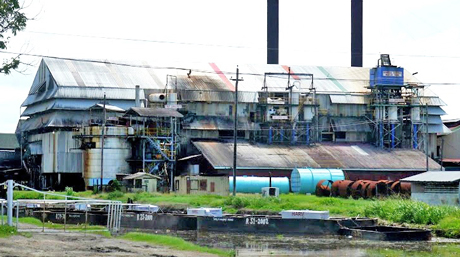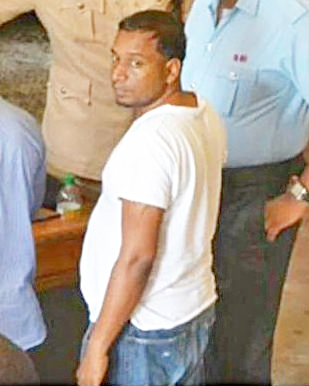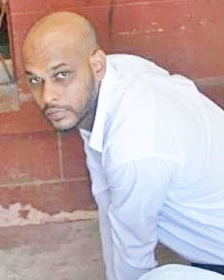Guyana Focus
perception or reality?

Criminals are unleashing massive fear in Guyana. That’s the story behind the headlines of the country’s daily newspapers. That’s also the perception among the people of Guyana.
But official statistics tell a different story. They show a dramatic decline in crime. And the government is sticking to its position of a fall in crime in the wake of allegations that its crime statistics are fabricated. For now, it’s a matter of reality versus perception. There is definitely heightened fear of crime in the country – no matter what
the government says. And the reason for such fear are very real. Even by the government’s own admission, its law enforcement officials lack the capacity to adequately deal with crime.
According to official statistics, reported serious crimes have fallen dramatically in recent years, from a record high of 14,855 incidents in 2014 to 4,170 incidents in 2018. The current level of crime is below the annual average of 4,515 incidents for the 2000-2018 period, which is a reasonable expectation. If 2014, an anomalous year is excluded, the average annual serious crime rate between 2000 and 2018 falls to 3,941, which is lower than the current rate, which is also not unreasonable.

Whether or not official crime statistics are real, the perception of higher levels of crime is evidently entrenched in the psyche of the people. But the people’s perception that crime is rising might just be real for several reasons.
For instance, at the end of May, Guyana’s Private Sector Commission (PSC) requested an urgent meeting with Minister of Public Security, Khemraj Ramjattan and Commissioner of Police, Leslie James to address “the increasing and widespread public concern over the manifestly frightening and disturbing incidents of violent crime across the country.”
To be fair to the police, the PSC acknowledged the recent success of the police in confronting violent crime and their continuing efforts to meet the growing challenge that “threaten the safety and well-being of every citizen.” But the PSC believes that much more can and should be done to deal with rising criminal activity.
In response to the PSC’s position, Minister Ramjattan insisted that crime is down and suggested that stories on the front pages of the media might give the perception that there is an upsurge in crime, noting that “it seems that they don’t believe my statistics.”
If the people of Guyana are wrong in their perception of higher levels of crime, the US government must also be wrong about crime in Guyana. During the last week of May, the US State Department’s Level 2 travel advisory on Guyana requested its citizens to exercise increased caution in the country due to crime. The release stated that violent crimes, such as armed robbery and murder are common, noting that local police lack the resources to respond effectively to serious criminal incidents.
The ongoing advisory cautioned US citizens to be extra vigilant when visiting banks or ATMs; to be aware of their surroundings; to avoid walking or driving at night; to not physically resist any robbery attempt; and to not display signs of wealth, such as wearing expensive watches or jewelry.
Following the release of the US travel advisory on May 29, Ministry of the Presidency Director General Joseph Harmon did not address the crime situation in the country but reportedly told a post-Cabinet press briefing that “Advisories are advisories and its advice to the citizens of a country from their government. It is not something we can say we are happy about because every time an advisory comes out, people think twice about travelling to your country. They think twice about if it is a good time to invest. Is it a good time to do this? Is it a good time to do that?”
Another signal that crime might be up – though denied by Minister Ramjattan – is the supplemental budget request for a 75% increase over the 2019 budget allocation for the police to handle an increase in dead bodies. In the 2019 Budget, the Guyana Police Force was allocated $64 million to pay for handling the dead but requested an additional $48 million supplement, which was approved by the National Assembly – bringing the 2019 allocation to $112 million. Comparatively, the budget for 2017 was $61 million and for 2018, $63 million.
In defending the higher budget, Ramjattan said the budgetary supplement took into account that there has been some amount of “inherent indebtedness” from the previous administration’s failure to complete payments to funeral homes which assist in the handling of bodies, noting that some debts go as far back as 2012, and that some – not all - of the supplement will be used to fulfill the outstanding debt.
In addressing the weakness in the police force, Ramjattan is reported telling the local media that the issue is not that the police aren’t catching the criminals; the issue is that the police do not have the “clinical edge” to tackle the sources of violent crime. He expects that with oil revenues coming on stream, the police will be in a better position to hire more qualified individuals to deal with crime.
However, recognizing weaknesses in the country’s ability to deal with crime, the United States announced early in May that it will increase its funding to help Guyana fight crime. The US Bureau of International Narcotics and Law Enforcement announced that it has set aside an additional US$850,000 to the “Strengthen the Criminal Justice System in Guyana” project and extended the timeframe for funding to a total of five years. In total, the US will invest US$1,796,394 in Guyana’s justice system through the project, which is now expected to run until March 2021.
Evidently, there is sufficient reason to believe that crime is escalating and not falling in Guyana. Government statistics are apparently unreliable, with different official sources providing different information. For instance, Annex 5, Guyana: Selected Socio-Economic Indicators, published by the country’s Bureau of Statistics states that total number of Reported Serious Crimes for 2014 was 3,688.
However, a statistical report published by the Bureau of Statistics (Social Indicators, Table 3.7) with the source as the Criminal Investigations Department (CID), states that the number of Reported Serious Crimes for the same year (2014) was 14,855. That’s more than a four-fold irreconcilable difference.
For 2015, the Bureau of Statistics reported an 8% increase in crime, reaching 4,008, a huge inexplicable difference of 10,847 offences, compared to the end of 2014 CID statistics. Evidently, crime statistics are at best unreliable or are being manipulated.
Both the current and past administrations have allocated increasing amounts of resources to fight crime but their efforts have not had the desired impact in a country where criminals reign supreme for real, inferred and inexplicable reasons.
The apparent surge in serious crimes – ranging from murder, violent robberies, rapes, burglaries and larceny has driven fear into the population, leading to the foreign flight for safety; and resulting in Guyana being labeled a crime haven by foreign governments. Denial of the problem is counterproductive to dealing with it.
by July – SPU

“Of the three estates up for privatisation, Rose Hall has received most of the interest. Out of the three companies interested in Rose Hall, [Pricewater-houseCoopers] is finalising discussions with one of the companies. Discussion are in a delicate state… we are hoping that by the end of July we can have an agreement which we can ask Cabinet to ratify” Head of the SPU Colvin Heath-London told a press conference Monday.
According to Wilfred Baghaloo, of valuator PricewaterhouseCoopers (PwC), the “front runner” is a joint Indian/Ghanaian consortium which is likely to produce sugar as well as inputs for the cosmetics industry at the estate. The consortium includes persons from India, Ghana and Guyana. The Guyanese include those providing legal services and former management of Rose Hall while Ghanaians are providing logistics and factory knowledge and the Indians technical expertise in sugar and machinery.
It is expected that all the estates privatised will remain in the sugar cane industry as opposed to the sugar industry and Baghaloo stressed that many things can be done with sugar cane.
He said the privatisation itself will be market-driven to ascertain the best commercial prices based on evaluations of business potential and asset value.
Monday’s press conference came just days after Director General in the Ministry of the Presidency, Joseph Harmon was unable to shed light on the intended privatization of the three estates when asked by Stabroek News at a press conference.
Baghaloo noted that he had met with Cabinet on March 19th and written it on two other occasions to give an update on the process, including the challenges being faced. “I told them there were three bids which came from a public process where proposals were requested [and that] we were likely to have conclusion to the privatisation of one of the estates by end of July and by the end of November we’ll have a better fix on the two other estates,” he noted, before adding that while the negotiations in relations to Rose Hall had progressed quite nicely nothing is completed as yet.
“We are now sharing a draft with their legal team and we’ll see what their response is,” he added.
Baghaloo clarified that while there are several challenges, the process is “proceeding quite nicely” in his opinion.
One of these challenges relates to access to financial information on the operations of the estates.
Baghaloo noted that challenges with valuation of assets anchors primarily around information that is needed from GuySuCo.
“To date, I have not received that information. I received an audit report but need management accounts for each estate [which would include] age of equipment, the names of the suppliers for major equipment, last maintenance dates…,” he explained.
This particular challenge is having the most impact in relation to the possible sale of the Skeldon estate.
“Because of various nuances in the media, Skeldon is a little challenging right now. It is also one of the bigger priced projects. It requires a lot more investment, a lot more due diligence, a lot more time but we have had interest and continue to have interest but they have not reached the level of negotiations. They are still fairly abstract. One party showed interest last week,” he shared.
The valuators have since 2017 and as recently as May 14th requested of GuySuCo the agreement with the manufacturers of the Skeldon Factory, age and duration of use of the equipment, the electricity co-generation plant’s historical information and agreements with electricity buyers so that “some rough calculations” of the economic value of the equipment can be completed.
Despite these requests and a directive from Cabinet that the information be provided, Heath-London explained that the SPU has only received an “acknowledgment” from GuySuCo. The SPU is, however, willing to continue to engage GuySuCo on a good faith basis.
“I’ve not felt any ill intent. I’m not happy with the flow of information and data but that’s kinda normal for most privatisations,” he said.
There has been tension between the SPU and GuySuCo over a number of issues including control of assets.
Baghaloo noted that Guyana’s privatisation attempt is unique as while three estates have been closed government retains ownership of the other three even as it invites the private sector into the industry.
This unique feature raises questions about the profitability of those estates. “Are these the least profitable estates? Why are you privatising these three and not the others? How do you ensure that they have an environment where private sector can compete with public sector for scarce resources, such as access to markets, access to cane, access to people, access to logistics, such as transportation? Those are the issues we have to resolve,” he stressed.
Other challenges include the political climate and the December 21st no-confidence vote, which according to Heath-London caused “several strong investors who were in play to sit out.”
He explained that these investors were concerned that a purchased asset could be nationalised. The People’s Progressive Party/Civic has publicly stated that it would not honour the sale of any sugar estate if it is re-elected.
“Questions arise about who will sign the agreement if there is no Cabinet in place…Suppose I spent all my resources, pay all my legal fees and end up in the period where general election is called? Am I wasting my money? Am I wasting my time?” Baghaloo added.
Meanwhile the lack of cane supply for the Enmore estate has affected the sale of that property.
In the case of Wales, Heath-London stressed that the diversification team has been able to enter into arrangements with several small, medium and large scale farmers, most of whom are Guyanese in origin, while several of the larger farmers are from farther afield, regionally and internationally.
“Work is ongoing in this field. Predominantly the crop these farmers want to put into production is rice and presently close to over 1,000 acres is under rice cultivation… Farmers who were given leases are now doing land conversion so as to plant their crops,” he explained, before adding that anyone who travels to Wales today will see this taking place.
“Wales is managed by an able agricultural team and a lot of those members are persons who would have worked with GuySuCo and we are providing technical support so the farmers that come into the space would be extended the support. The small farmers in and around the area [will have] technical support,” he said.
He further explained that while agricultural lands surrounding the three estates to be privatised will remain property of people of Guyana, they will be leased to provide for production needs of the factories and surrounding land of approximately 15 to 20 acres will be sold.

Businessman Ally, 30, of Goed Fortuin, West Bank Demerara; and Canter truck driver Persaud, 32, of Lot 47 Kingston Street, ‘C’ Field Leonora, West Coast Demerara were handed sentence in the Georgetown Magistrates’ Courts where their trial was being conducted.
It was alleged that on February 6, 2018, at Laparkan Cargo Shed at the Cheddi Jagan International Airport (CJIA) they trafficked 9.366 kilograms of cocaine in fish.
Custom Anti-Narcotics Unit (CANU), Prosecutor Konyo Sandiford represented the state in the matter. According to information, the shipper was Ally while Persaud was the transporter of the boxes of frozen fish stuffed with cocaine to the airport.

During the search, the ranks found a quantity of cocaine stashed in frozen fish that was destined for the USA.
An investigation was then carried out and the two defendants were arrested and charged for the offence.
To advertise in ICW call
Call 905-738-5005